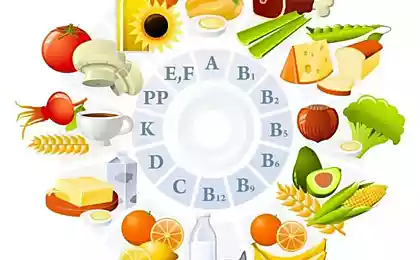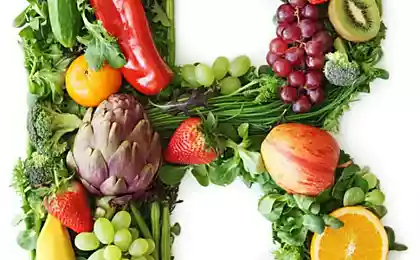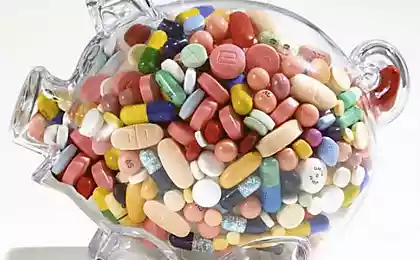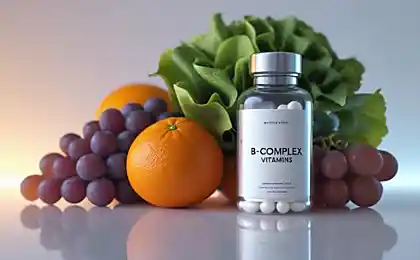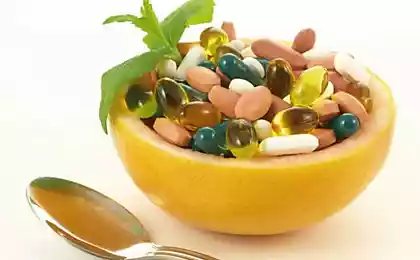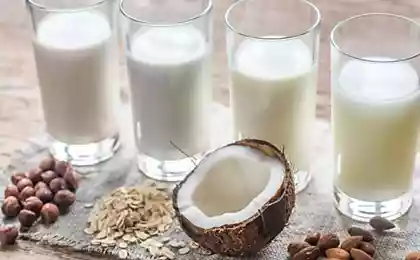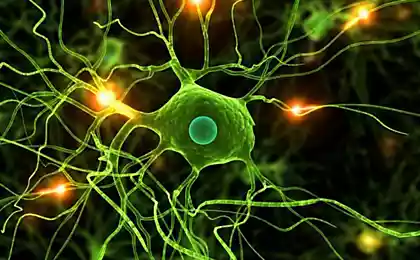507
7 essential vitamins needed by the body after 40 years
Adhere to well balanced dietthe Root word vitamins-vita in translation from Latin, and literally means “life”. Vitamins are so important that even if your body gets other essential nutrients, but lack vitamins, this can lead to a host of diseases and General poor health.

When you get older, some vitamins become even more important for the health of your body. Digestive and dental problems that appear with age, can also affect your ability to get the maximum amount of nutrients. The elderly often begin to develop degenerative problems such as osteoporosis, heart disease, or diabetes, all related to food.
The Group Of B Vitamins
Our body requires not one item but a group of vitamins that affect everything from the red blood cells to our nervous system. They include thiamine, Riboflavin, nicotinic acid, Pantothenic acid, Biotin, vitamin B6 and vitamin B12. Vitamin B12 is especially important when you get older, because more Mature body is unable to absorb the nutrients as well as at a young age. Proteins – fish, poultry, meat and eggs, dairy products, green leafy vegetables, beans and peas are a good source of vitamins. Vegetarians and vegans (especially) may need vitamin B12 in supplements because their protein sources are limited.
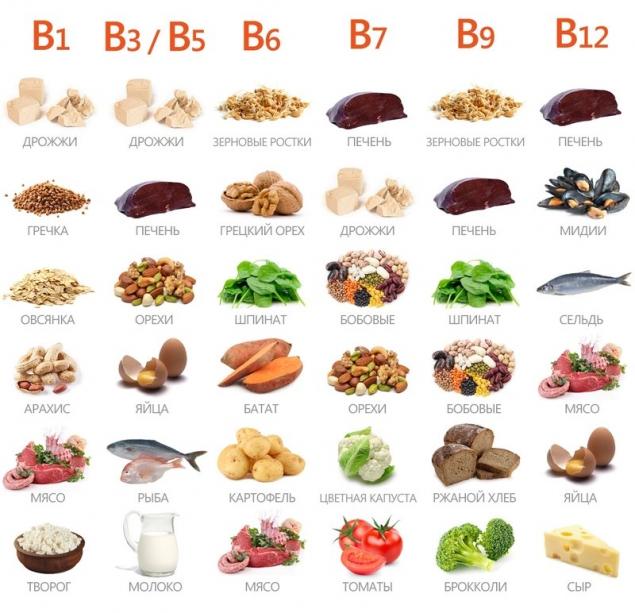
Vitamin B6
Vitamin B6 is another important vitamin for those who have crossed forty years. This vitamin is essential for metabolism of blood sugar and fat metabolism, and to reduce the risk of cardiovascular disease, and also helps to prevent the development of complications of diabetes. Meat, vegetables, nuts, such as almonds and walnuts, and bananas are an excellent source of vitamin B6.
Vitamin D
Insufficient amounts of vitamin D, the “sunshine vitamin”, the body can be due to a number of age-related diseases such as heart disease, diabetes, multiple sclerosis, breast cancer and colorectal cancer; most of these diseases affect people ages 40 years or older. Vitamin D is also important for strong bones, helping prevent osteoporosis. Fish and some grain products are a source of vitamin D, but people usually don't absorb vitamin D from foods,sunlight is the best source.
Vitamin A
This vitamin is essential for various functions in the body, but especially for vision. Age-related visual problems include macular degeneration and cataracts. The immune system, which helps protect you from infections, also needs adequate amounts of vitamin A. do Not forget that once you get older, your immune system becomes more vulnerable. Such foods as liver, egg yolks, sweet potatoes, spinach, carrots and pumpkins are excellent sources of vitamin A.
Vitamin C and E
Vitamins C and E are antioxidants. Antioxidants neutralize free radicals molecules that occur when body cells are destroyed. Free radicals can contribute to aging of the tissues. Need regular intake of foods high in vitamin C because the human body cannot store this vitamin.
These vitamins are important for skin, bones and connective tissue, and promotes wound healing.Good food sources of vitamin C include citrus fruits and vegetables such as peppers, tomatoes, broccoli and green leafy vegetables. Vitamin E, generally found in oils, nuts, seeds, and greens.
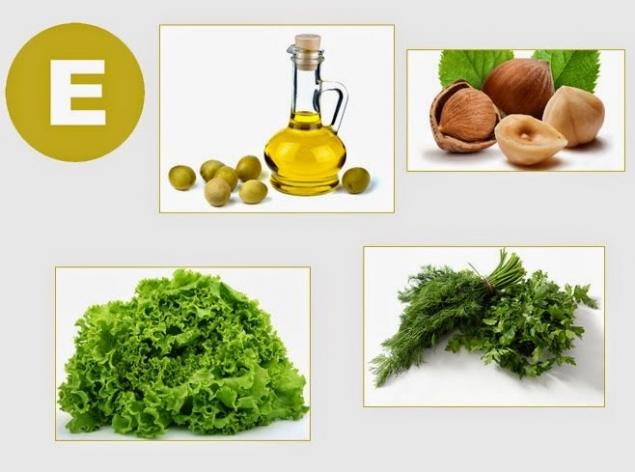
Vitamin K
Vitamin K helps your blood clotting. This is especially important when you get older because your skin becomes thinner. This vitamin can also help keep your bones strong. Although humans can produce vitamin K in the intestines, foods that are excellent sources of this vitamin include green leafy vegetables, cruciferous vegetables like broccoli and cabbage, fish, liver, meat and eggs.
If you adhere to a well balanced diet, you can obtain a large amount of vitamins from food. However, the problem of absorption can limit the effectiveness of vitamins. Your doctor may check the levels of certain vitamins and give you recommendations on improving your diet, if the problem is discovered. Do not forget that minerals are also important for your health and can act synergistically with certain vitamins. Vitamin C, for example, increases the absorption of iron. Vitamin D and calcium are necessary for strong bones. published
P. S. And remember, just changing your mind — together we change the world! ©
Source: //positivemedrussia.com/2016/11/25/%D0%BF%D0%BE%D1%81%D0%BB%D0%B5-40-%D0%BB%D0%B5%D1%82/

When you get older, some vitamins become even more important for the health of your body. Digestive and dental problems that appear with age, can also affect your ability to get the maximum amount of nutrients. The elderly often begin to develop degenerative problems such as osteoporosis, heart disease, or diabetes, all related to food.
The Group Of B Vitamins
Our body requires not one item but a group of vitamins that affect everything from the red blood cells to our nervous system. They include thiamine, Riboflavin, nicotinic acid, Pantothenic acid, Biotin, vitamin B6 and vitamin B12. Vitamin B12 is especially important when you get older, because more Mature body is unable to absorb the nutrients as well as at a young age. Proteins – fish, poultry, meat and eggs, dairy products, green leafy vegetables, beans and peas are a good source of vitamins. Vegetarians and vegans (especially) may need vitamin B12 in supplements because their protein sources are limited.

Vitamin B6
Vitamin B6 is another important vitamin for those who have crossed forty years. This vitamin is essential for metabolism of blood sugar and fat metabolism, and to reduce the risk of cardiovascular disease, and also helps to prevent the development of complications of diabetes. Meat, vegetables, nuts, such as almonds and walnuts, and bananas are an excellent source of vitamin B6.
Vitamin D
Insufficient amounts of vitamin D, the “sunshine vitamin”, the body can be due to a number of age-related diseases such as heart disease, diabetes, multiple sclerosis, breast cancer and colorectal cancer; most of these diseases affect people ages 40 years or older. Vitamin D is also important for strong bones, helping prevent osteoporosis. Fish and some grain products are a source of vitamin D, but people usually don't absorb vitamin D from foods,sunlight is the best source.
Vitamin A
This vitamin is essential for various functions in the body, but especially for vision. Age-related visual problems include macular degeneration and cataracts. The immune system, which helps protect you from infections, also needs adequate amounts of vitamin A. do Not forget that once you get older, your immune system becomes more vulnerable. Such foods as liver, egg yolks, sweet potatoes, spinach, carrots and pumpkins are excellent sources of vitamin A.
Vitamin C and E
Vitamins C and E are antioxidants. Antioxidants neutralize free radicals molecules that occur when body cells are destroyed. Free radicals can contribute to aging of the tissues. Need regular intake of foods high in vitamin C because the human body cannot store this vitamin.
These vitamins are important for skin, bones and connective tissue, and promotes wound healing.Good food sources of vitamin C include citrus fruits and vegetables such as peppers, tomatoes, broccoli and green leafy vegetables. Vitamin E, generally found in oils, nuts, seeds, and greens.

Vitamin K
Vitamin K helps your blood clotting. This is especially important when you get older because your skin becomes thinner. This vitamin can also help keep your bones strong. Although humans can produce vitamin K in the intestines, foods that are excellent sources of this vitamin include green leafy vegetables, cruciferous vegetables like broccoli and cabbage, fish, liver, meat and eggs.
If you adhere to a well balanced diet, you can obtain a large amount of vitamins from food. However, the problem of absorption can limit the effectiveness of vitamins. Your doctor may check the levels of certain vitamins and give you recommendations on improving your diet, if the problem is discovered. Do not forget that minerals are also important for your health and can act synergistically with certain vitamins. Vitamin C, for example, increases the absorption of iron. Vitamin D and calcium are necessary for strong bones. published
P. S. And remember, just changing your mind — together we change the world! ©
Source: //positivemedrussia.com/2016/11/25/%D0%BF%D0%BE%D1%81%D0%BB%D0%B5-40-%D0%BB%D0%B5%D1%82/
Neuroscientist Lisa Feldman: How the brain creates emotions
New technology of three-dimensional glass printing

